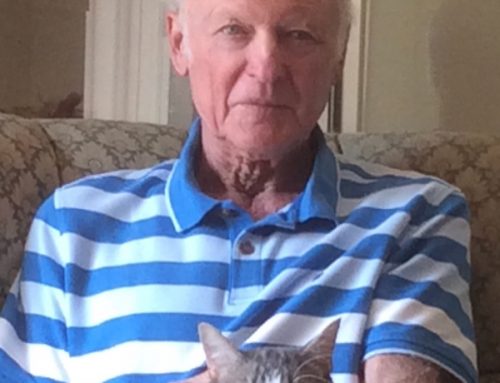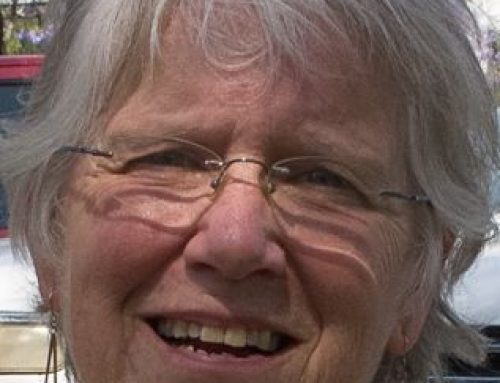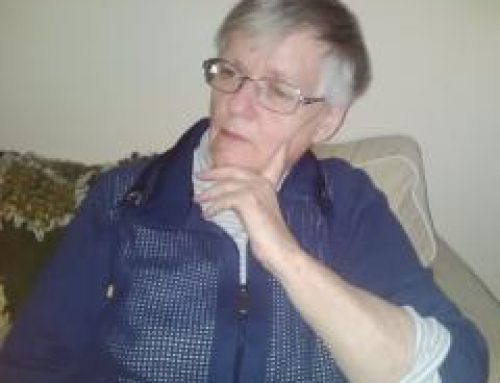by Gary Thomson
The Chester Billings parkette gathered Clara Knox and her friends many summer afternoons when the companions were between engagements. That was Louella Dickens’ term — engagements — for part time work that paid little, and ended soon after it began. Clara was watching two gulls squabble around an overfull rubbish bin. She bristled when Richie O’Brien nodded towards her cigarets. “Give us a smoke, Clara? I’ll pay you back next weekend.” When pigs wear bow ties, Clara thought. To extend her smoking needs over several days, Clara took care when she left the parkette to leave the open packet with Ayaaz Mahmood who owned the convenience store across the road. He stowed it behind his cash counter in a plastic hold-all with his stapler and a topless ballpoint pen. The surrender of her cigarets was a moral aid towards eventually quitting.
She was still scratchy with resentment when Mr. Cross announced the imminent arrival of the travelling organ grinder. “He’s of the gypsy persuasion, from the mountains of Roumania, I’d venture. But far from Dracula’s castle.” His audience listened with silent caution: they knew something of Mr. Cross’s longago world travels.
Doris Flood harrumphed, and repositioned her immense body along the park bench. Beside her Louella Dickens sipped from her takeaway coffee cup. “How are you . . . persuaded . . . to be a gypsy, Mr. Cross?” Immediately she regretted the question. Louella always said that Mr. Cross could turn the simplest query into a sermon.
Mr. Cross brushed at a stain on his shirt front, and for a time nothing more was said of the music man. Mrs. Witherall plunged a frail hand into her sewing bag and tried toremember what item of knitting she would find there. Vaguely she recalled a gypsy from an old movie: thick moustache, embroidered shirt, flinty stare. The name Bela Lugosi sounded in her head. Louella saw herself at next Wednesday’s bingo, seated at her lucky bench, three rows removed from the caller’s podium. Clara closed her eyes towards the afternoon sun, shut her mind to the squalling gulls and Richie’s cajolery.
The parkette was an oasis of tranquility huddled beside a broad, sluggish river. Three worn benches sat open for tired strollers. A children’s play area offered two swings (one missing its restraining belt), a red slide, and a sandbox holding a half-buried toy tractor. Mature pine trees littered the ground with brittle cones. Afternoon shadows from Ayaaz’s store, the Sunshine Superette, reached towards the swings.
Mr. Cross went on, “I saw a poster of the music man, in Wellman’s bookstore. Dressed in red tunic and green pantaloons. Impressive figure indeed.”
“Not much like this Dracula dude,” said Richie. He knew the sermon had begun; he pulled on his cigaret.
Mr. Cross let the comment pass. “His trained monkey was secured to the hurdy-gurdy with a leather leash. Devils in disguise they are, with their pillbox hats and waistcoats. They’ll pilfer the coin straight from your pocket.”
Clara savoured the warmth over her face and heard only a droning from Mr. Cross. Doris Flood heard a few details, Louella even fewer. It was hard to listen to Mr. Cross when he rattled on about these exotic encounters. They did listen, though, when he spoke of new government benefits, and how to apply for them; or when he told of a woman beaten up not far from here. You listened then, for the full story.
Weekday mornings, Clara walked from her rooming house on a tree-lined avenue to her work in a late Victorian industrial building that now served as a glove factory. She was a capable employee, and her line supervisor spoke well of her stitching and sorting skills. Clara loved the smell of machine oil and new leather and the sense of independence her position gave her. Frizzy-haired and bespectacled, Clara has been working and living on her own since she was eighteen, the year after her father sent home a note from a business trip to Winnipeg stating he would not be returning to the family house. Her mother, always frail and excitable, explained to Clara through a rush of nerves, and soon became a shrunken, vodka-drinking night wanderer in the house.
If Clara showed good work habits at Regent Gloves for another four months, she would be eligible for full-time employment, which meant seniority and paid insurance benefits. She could say goodbye to shopping at Goodwill, and have a little extra money for a new summer frock to lift her spirits. She was reduced to a shortened schedule—two, sometimes three days per week—when Mr. Cross spoke of the gypsy musician and the pipe band concert. She knew the factory was waiting on a government order of dress gloves for the Mounties that would get her a call back to full-time work.
Doris Flood asked Mr. Cross if the band was the sort that moved in lines and squares, like at halftime on telly. “That’s sparkly music. Makes you want to step around the room, smart-like.” Doris easily offered amusements from her past to the companions. But a grey sorrow hung over her present behaviours. “I’m too fat and can’t get around like I used to,” she said. “Knees always aching . . . and it’s making my liver tired.”
“Maybe you’ll hear the music again, Doris.” said Mr. Cross. “We might all go. Make a picnic, share in the monkey’s antics. Enjoy a fun afternoon.”
No one answered Mr. Cross. They knew he was thinking through details of transportation, food sharing, and seating for the women.
*****
Clara walked across the street to the Sunshine Superette, and stepped inside, into the cool air. At the front counter Ayaaz was restocking a plastic flex board with rows of lottery tickets. He secured the ticket board beneath a glass cover, and when Clara handed him her cigaret packet, he said, “When can I throw these in the rubbish bin?”
“Soon, if Richie keeps playing the charity case.”
“He knows a kindly soul when he sees one,” Ayaaz said.
Clara had been making small purchases of instant coffee, bread, cigarets, and menthol cough drops from Ayaaz for about a half-dozen years now. She always asked after Ayaaz’s wife, and their son and his wife who worked in the oil patch in Alberta. In turn, she brought to Ayaaz the small triumphs and worries and brief health reports of her friends. She told him of Richie’s sore back from lifting a table on his most recent job. She spoke gently of Mrs. Witherall’s declining memory. These were Clara’s reality patches set beside the fantasy board of the lottery tickets. “Mr. Cross wants us to see a performing monkey. Claims it’ll be the highlight of our summer.”
“I’ve never seen a dancing monkey,” Ayaaz said. “But I do see a few shifty birds in here through a week, working their routines. Sticky fingers and attitudes—all of them.”
“My friend Amy Holland had a dancing ballerina, when we were kids,” Clara said. “It came out of a little house, on the hour. Two fingers of her left hand were missing and the glass door wouldn’t shut when she finished her turns.” Sometimes the music and the ballerina’s smiling porcelain face sprang unbidden from Clara’s memory. She hoped one day to find a similar working version in the Goodwill shop. “That little doll was part of Amy’s family. She was lucky that way.”
Ayaaz smiled. “I wish you’d leave off these killer sticks, Clara.”
“And have Richie’s withdrawal on my conscience as well?”
*****
Clara walked from Ayaaz’s Superette along the river walkway for about half a mile. The afternoon sun warmed her shoulders. She watched the current nudge a shopping cart against a submerged rock. What she would like to do is stash one of those novelty cigarets in her packet, the kind that never light. Offer it to Richie next time he came cadging a smoke. Watch his mouth pull real hard, and his puzzled face wondering: what the hell. She’d tell him, Ooopps, practical joker on the packing line, Richie.
Smiling, she turned onto Queen Street, and into the shade of mature maple trees. She stopped beside a cardboard box set at the end of the drive to house number 239. Black lettering—“FREE”— covered one side of the box. Clara rummaged through a stack of jigsaw puzzles, wool hats, and wooden spoons. Beneath the clutter her fingers closed around a soft, nubbly fabric. Clara pulled a doll out of the box, and examined it.
The doll’s flat pug face was shaped from linen, stained along the right cheek. Two brown socks stuffed with rags made limp arms. Her left eye, a pale green button, dangled towards the red embroidery stitching of her mouth. Clara saw in the doll’s tormented face a mute plea for rescue. “We’re a lot alike, aren’t we?” she said. “Worn around the edges, and some days too much alone. Won’t a good dollop of Murphy’s soap clean you up.”
She looked into the shadowy doorway. Clara wondered, who was the little girl in there who had tended the doll after a tumble, or wiped the imaginary tears from her green-button eyes? That was Amy Holland’s favourite pastime, with her ballerina doll. Clara recalled Amy wagging her middle finger to coax the doll back into her glass house when the music and chimes had stopped. “She’ll be safe and content there,” Amy said. “Where she belongs.”
Clara cradled the doll in her left hand and continued her walk along Queen Street. We’ll go round to Mrs. Witherall’s, now, she thought. Ask her to knit you a bright headband. Make you feel new and alive again.
*****
On the following Saturday the companions gathered in the parkette under a leaden sky that threatened rain. Mr. Cross chewed on a black Smith’s cough drop, and rattled on about summer being a terrible time to be chasing after a cold. Mrs. Witherall was knitting a headband for Clara’s doll, green with gold borders. Her watery eyes gleamed. Louella Dickens opened her worn handbag and pulled forth a stuffed envelope. “This week my bingo chips fell into place,” she announced. “So, in celebration . . . a gift for you all.” She fanned a cluster of tickets in her right hand.
“What surprise is this, Louella?” asked Mr. Cross.
“For the concert, Mr. Cross. What you was telling us about last week.”
“This is a trick,” said Doris Flood. “It’s Richie ‘as put you up to it.”
Louella offered up a ticket for inspection. “Read it, Mr. Cross. Look here, plain as your finger. ‘The Celtic Connection. Rayman Park. Saturday 28 July 2:00 pm.’ And see this: ‘Special guest . . . Mr. Liberty Crocker . . . and Bagwell . . . in Performance.’” She set her mouth in confirmation. “It’s your gypsy music man and his monkey.” She cast a scornful look at Doris, who turned her head away. Then Louella peeled individual tickets from the bundle and passed one into each extended hand.
Mr. Cross worked his cough drop under his tongue. “Louella, this is a magnanimous gesture, surely.” He studied the expectant faces. “Of course we’ll go. A picnic lunch and music . . . we’ll have the time of our lives.” He looked at Louella. “Shall I hold the tickets for the interim? Guard against loss or misadventure.” He suspected that Richie would resell his ticket in an instant, and that Mrs. Witherall might misplace hers.
“If you wish, Mr. Cross,” Louella said. She was thinking of her summer dresses, would she wear the cute yellow floral one or the snazzy lime-green number with the shiny white belt.
*****
On the appointed day Mr. Cross situated the companions on a grassy knoll under the shade of a patriarchal willow tree. They looked onto the bandstand, about fifty yards away. He settled Mrs. Witherall into the folding chair with the high back and sloping leg rest. She checked her pattern of stitches in her knitting, and hummed a melody that was running in her head. “You rest and finish a row or two,” Mr. Cross said. “We’ll have you fed in short order.” Doris explained to him Richie’s absence: a leg of a sofa that he was moving had landed on his foot, and he could barely walk.
Clara wrapped a spare Food City bag around her little Orphan Annie. That was Clara’s name for the found rag doll from her favourite Saturday comic strip. Annie with big round eyes and frizzy hair. And over her shoulder, her dog Sandy, looking protective and quizzical. You’re an orphan no more, Clara thought. You’ll hold your head high with your new headband. She set Annie along a chair leg. Then she helped Louella to unpack the picnic hampers. “Your new frock looks like cool sherbet,” Clara said.
****
On schedule, the mayor jounced onto the stage. He welcomed the crowd and urged them to support today’s sponsors. “Now, sit back, and enjoy the rousing music of the Knightsbridge Drum and Pipe Band.”
Clara never gave much thought to the music that played on the mantel radio in her small apartment. Mostly it hovered in the background, irrelevant and forgettable. But here, as the reedy moan of bagpipes spread along the hill, she knew this music had its own power and mystery. The hairs along her forearms and neck had risen. The notes wailed and groaned, paused and then lifted towards distant hills. There was sighing of wind over water. There was dark moss over weathered gravestones; and in her mind the pine trees in the parkette brooded over the empty sandbox. It was a magical sound that came to her from another, faraway world.
Louella was passing around a platter of Strub’s dill pickles when the MC announced the feature attraction: “Now, ladies and gentleman, all the way from a rousing performance at Niagara’s Summerfest . . . Mr. Liberty Crocker . . . and his dancing monkey, Bagwell.”
The music man was pushing his barrel organ to centre stage and smiling towards his audience. The instrument gleamed under new shellac and freshly painted gold and red roses that curled along its sides. Clara admired his green silk pantaloons and billowing white linen shirt. She laughed when Crocker turned his hand crank to begin a tinny waltz tune, and suddenly the monkey poked his head out of an opening on top of the organ.
Clara pulled Annie out of the plastic bag, and set the doll astraddle her left leg. Clara had cleaned Annie’s face and stitched the tangled hair. With her button eye repaired, she could look on and enjoy the show.
The monkey adjusted the brim of his tan fedora, and then pulled himself onto the organ platform. Swaying to the music, he doffed his fedora and bowed to the crowd.
Crocker motioned Bagwell forward, then from a small wicker basket he filled Bagwell’s hands with coloured lollipops. Bagwell lobbed the candies towards squealing children and smiling adults.
As the music selections from the hurdy-gurdy changed, so too did the games: from juggling with yellow, red and black beanbags to toss-and-catch with the Frisbee, where Bagwell followed each expert catch with a fluid backflip. He peeled a banana and tossed the skin slyly behind Crocker, who staged a dramatic slip and timely recovery. Bagwell shrieked in fake laughter.
Shortly after, Crocker bowed to his audience, and extended his hand to Bagwell. Together they left the stage on a wave of applause.
*****
After the concert Mr. Cross ushered his riders to the car. He told Doris to leave the car radio off, that he wanted to hold the pipers’ music in his head. Mrs. Witherall said that Richie’d be sorry he missed the show, and free at that. Clara asked Mr. Cross to drop her at the Sunshine Superette, where she had a couple of items to buy. In this nice weather she preferred the walk home.
She found Ayaaz down by the magazine racks. He was tidying a bundle of community newspapers for display along wire shelving. She wanted to tell Ayaaz about the dancing monkey, that it did have sticky fingers, but only for Frisbees and lollipops, not for stolen candy bars. She wanted to share with him the wonder of the strange, compelling flight away from herself that the pipers’ music prompted.
She would try to explain the bond between the gypsy man and his animal friend, how they were joined by time and trust and a mutual dependence. What would happen when one of them was too old to perform, she wondered. Would they each retreat into memory to keep the games and music fresh and lively.
But Ayaaz never asked about the concert. He was bubbly with news from his son and daughter-in-law. “Their first baby coming soon,” he said. “Now my wife is all over the place, buying baby clothes, and searching out nursery toys. Next stop—the poor house.”
Clara glanced at the front page of the newspaper that Ayaaz was arranging into a neat pile. A young couple embraced beneath a headline: “Dance-a-thon for Cancer a Huggable Hit.” “Will you be going out there to live, be near your new family?” she asked.
Ayaaz shook his head. “This is our home now.” He lifted the newspapers onto the shelving. “And what young couple wants parents fussing about to see if they’re raising properly the children. No . . . too much I would miss you and your friends.”
Clara passed along her congratulations to the expectant parents. She bought a carton of orange juice and a packet of biscuits. Ayaaz asked her if she had stopped smoking. Clara shook her head. He said, “One day you will be ready. You see.”
None of the companions, who lounged in the parkette on a summer evening or bundled against the creeping chill of autumn afternoons, spoke of Bagwell or the organ grinder again. Other events or issues called for their attention: Mrs. Witherall’s arthritic hands, Richie’s new job as parking lot attendant, and the ominous mention of a peeping Tom over on Albion Street. Clara’s permanent placement at the glove factory came through on the same day her section completed the order for the Mountie dress gloves. She imagined a tall RCMP officer in Ottawa wearing a pair against the chill, grateful for their warmth. “We hope you’ll be with us a long time, Ms. Knox,” said her supervisor.
As autumn waned, the last of the dry leaves fell onto the walkways of the parkette. Clara and Annie sat on a weathered bench, and gazed along the river. Clara hummed a few remembered phrases of the tinny waltzes, and again she saw Bagwell’s face crinkle as he schemed his mischief on Crocker. She thought that it might be a grand thing to wander far away and bring amusement and pleasure to people. Even now those two might be riding through mountain villages in a painted cart drawn by a plodding donkey, home at last in the land of the gypsies. She coaxed Annie along her leg to rest against her stomach. The gesture reminded her of Amy Holland, tucking her ballerina doll into its glass house. “Where do people go when the music and chimes have stopped,” she said to Annie.
The gypsy’s waltzes fled before the haunting notes of the Knightsbridge pipers. The hair on her arms tingled with excitement once again. She knew that she would wait out her days here, keeping watch over Mrs. Witherall and urging Ayaaz for updates on his new grandchild. She danced Annie along her legs. “We’ll make our own mischief, you and me. Start by giving Richie my remaining cigarets. Include a trick unlightable one. Watch him dance around that surprise.” She chuckled, and held Annie aloft.
The westering sun cast lengthy shadows from the Sunshine Superette over the bench, broad silky bands that held them both warmly.
April 2015

 Gary Thomson is a retired language teacher in Belleville, Ontario. He has placed numerous travel and historical articles in Canadian and international magazines. His short fiction has appeared in Windsor Review, Fractal, Writing Tomorrow and The Crescent Review. For relaxation he blows Satchmo tunes on his Hohner harmonica.
Gary Thomson is a retired language teacher in Belleville, Ontario. He has placed numerous travel and historical articles in Canadian and international magazines. His short fiction has appeared in Windsor Review, Fractal, Writing Tomorrow and The Crescent Review. For relaxation he blows Satchmo tunes on his Hohner harmonica.



